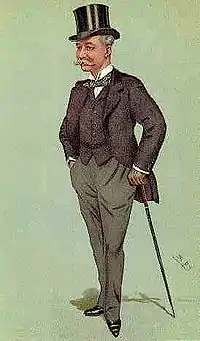Laurence Oliphant (British Army officer)
General Sir Laurence James Oliphant, KCB, KCVO, JP, 9th of Condie and 31st Chief of Clan Oliphant (14 December 1846 – 6 July 1914) was a British Army general who reached high office in the early years of the twentieth century.
Sir Laurence Oliphant | |
|---|---|
 General Sir Laurence Oliphant | |
| Born | 14 December 1846 |
| Died | 6 July 1914 (aged 67) |
| Allegiance | United Kingdom |
| Service/ | British Army |
| Rank | General |
| Unit | Sudan Campaign Second Boer War |
| Commands held | Northern Command Home District |
| Awards | Knight Commander of the Order of the Bath Knight Commander of the Royal Victorian Order Mentioned in Despatches |
Military career
Oliphant was commissioned into the Grenadier Guards in October 1866,[1] was promoted to lieutenant and captain in December 1869, and to captain and lieutenant-colonel in December 1876. He was regimental major from November 1882, and served in the Sudan Campaign in 1885. Promoted to colonel in 1886, he was lieutenant-colonel in command of the 3rd battalion from October 1889, and colonel in command of the Grenadier Guards Regiment from July 1894.[2]
Oliphant was promoted to major general on 26 November 1898, and in February 1900 received a temporary appointment commanding the Militia at Aldershot.[3][4] Later the same year he went to South Africa to serve in the Second Boer War, where he was in command of the Elandsfontein district and Klerksdorp sub-district. For his service he was mentioned in despatches (including by Lord Kitchener dated 23 June 1902),[5] and was created a Companion of the Order of the Bath (CB) in the October 1902 South Africa Honours list.[6] Later the same year he was appointed a Commander of the Royal Victorian Order (CVO) in the November 1902 Birthday Honours list.[7] After the end of the war in June 1902, he stayed on in South Africa for several months as General officer in command of the Potchefstroom district.[8][9]
He was appointed Major General commanding the Brigade of Guards and General Officer Commanding the Home District for three years from 1 January 1903.[2] He then served as General Officer Commanding-in-Chief for Northern Command in 1907; he retired in 1911.[10]
He later held the office of Justice of the Peace for Perthshire.[10]
Family
Laurence was the only son of Laurence Oliphant, 8th of Condie, Member of Parliament for Perth who died when Laurence was sixteen.[11][12] In 1878 he married Hon. Mary Monica Gerard and together they went on to have two sons and a daughter.[10] His ancestral seat, Newton of Condie, was destroyed by fire in 1864.[13]
References
- Burke's landed gentry of Great Britain By Peter Beauclerk Dewar, Page 1123
- "Naval & Military intelligence - Command of the Home District". The Times (36903). London. 20 October 1902. p. 8.
- "No. 27165". The London Gazette. 16 February 1900. p. 1078.
- "Naval & Military intelligence". The Times (36061). London. 9 February 1900. p. 11.
- "No. 27459". The London Gazette. 29 July 1902. pp. 4835–4837.
- "No. 27490". The London Gazette. 31 October 1902. p. 6897.
- "No. 27493". The London Gazette (Supplement). 7 November 1902. pp. 7161–7163.
- "No. 27496". The London Gazette. 18 November 1902. p. 7339.
- Hart′s Army list, 1903
- Mosley, Charles, editor. Burke's Peerage, Baronetage & Knightage, 107th edition, 3 volumes. Wilmington, Delaware, U.S.A.: Burke's Peerage (Genealogical Books) Ltd, 2003.
- Burke's Landed Gentry 19th Edition, The Kingdom in Scotland
- Burke’s Peerage & Baronetage 107th Edition
- "Laurence James Oliphant". British Empire. Retrieved 4 June 2019.
| Military offices | ||
|---|---|---|
| Preceded by Sir Henry Trotter |
GOC Home District 1903–1906 |
Succeeded by Sir Frederick Stopford As GOC London District |
| Preceded by Sir Leslie Rundle |
GOC-in-C Northern Command 1907–1911 |
Succeeded by Sir Herbert Plumer |
